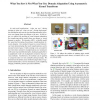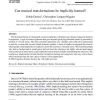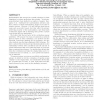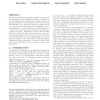528 search results - page 10 / 106 » What Can We Learn Privately |
CVPR
2011
IEEE
13 years 3 months ago
2011
IEEE
In real-world applications, “what you saw” during training is often not “what you get” during deployment: the distribution and even the type and dimensionality of features...
COGSCI
2004
13 years 7 months ago
2004
The dominant theory of what people can learn implicitly is that they learn chunks of adjacent elements in sequences. A type of musical grammar that goes beyond specifying allowabl...
SIGMOD
2005
ACM
14 years 7 months ago
2005
ACM
Randomization has emerged as a useful technique for data disguising in privacy-preserving data mining. Its privacy properties have been studied in a number of papers. Kargupta et ...
DEON
2010
Springer
13 years 10 months ago
2010
Springer
We provide a logical analysis of private international law, the body of law establishing when courts of a country should decide a case (jurisdiction) and what legal system they sho...
STOC
2001
ACM
14 years 8 months ago
2001
ACM
d Abstract] Shai Halevi Robert Krauthgamer Eyal Kushilevitz Kobbi Nissim ? The notion of private approximation was introduced recently by Feigenbaum, Fong, Strauss and Wright. Inf...




